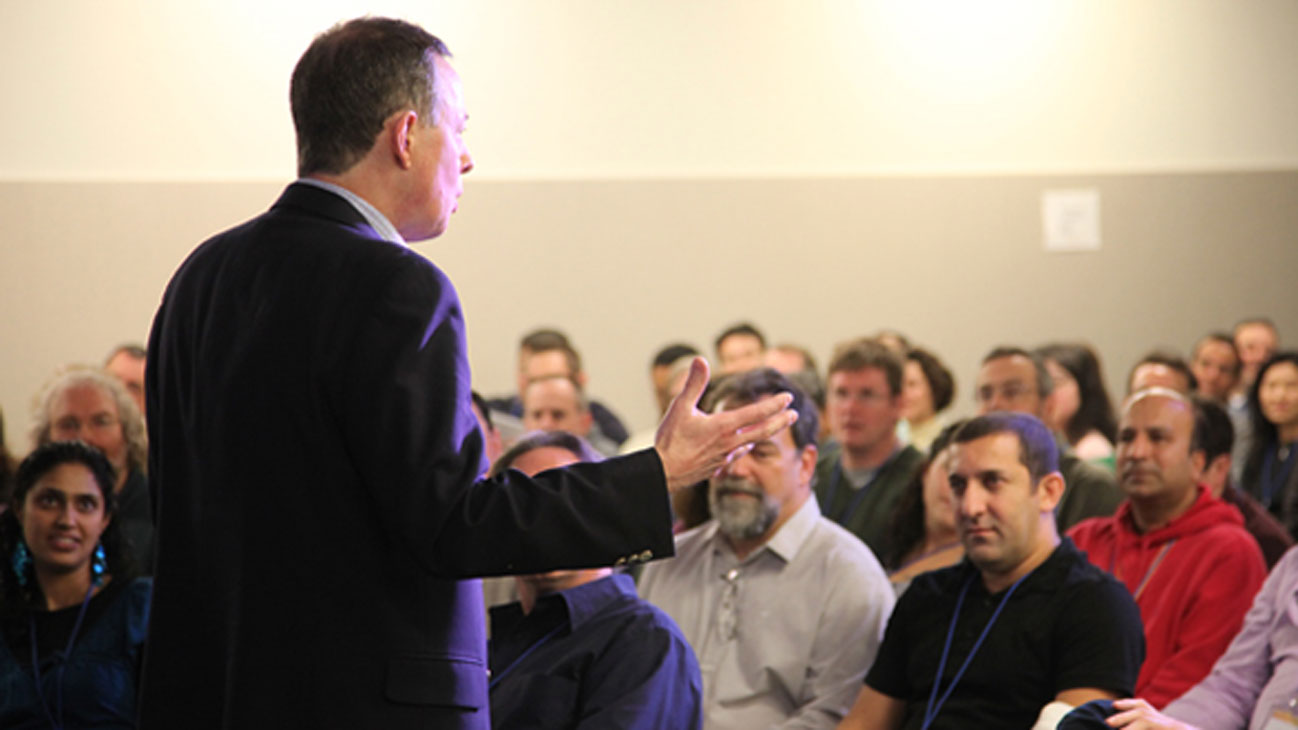Great speeches can change the world. Perhaps no one understands this better than Nick Morgan, one of North America’s top communication coaches. Regularly commissioned by leaders at the top of their fields―from political giants to CEO’s of Fortune 50 companies―to help them deliver their messages in the most compelling manner possible, Nick helps audiences understand the impact their words, delivery, and body language can have when presenting to an audience, whether in a boardroom capacity or in front of a crowd. Here, Nick takes a look at the annual “celebrity commencement address” and breaks down a recent effort by television’s Stephen Colbert:
Tis the season of commencement addresses, and celebrities are in hot demand – especially celebrities with some connection to your school. The University of Virginia brought comedian Stephen Colbert to address the new class of 2013, because he’s a funny guy, and because his wife went to UVa. Stephen himself, so he says, was not admitted, even as a transfer student.
Colbert’s speech mostly hit the mark. As a former student, administrator and teacher at UVa, I’d have to give him a “B,” because his jokes about UVa were mostly the usual clichés, though delivered in his trademark style and appreciated by the audience. And he was under-rehearsed, muffing a number of his lines because he misread them. Or perhaps he was hung over from partying with the students the night before? His long Jefferson quote at the end was read in a way that indicated he had no idea of the meaning of what he was saying; they were just words.
Nonetheless, for some good topical humor about the University’s embattled president, and for some funny callbacks, he deserves the B instead of what they used to call a “gentleman’s C” at Mr. Jefferson’s University.
Humor is risky, of course; on the one hand, what if they don’t laugh? And on the other, what if you offend? Colbert did a good job treading that line, between pablum and words that might shock the parents of the graduating class.
Colbert’s effort suggests a few rules of the road for humorous public speaking:
1. Humor is its own justification. If the audience laughs, you succeed. That’s the only test of funny that matters. So worry about propriety after you test how hilarious your lines are. Humor is all about stepping on toes and over lines, after all.
2. But know your audience. Colbert only attempted one mildly off-color joke, and it was a gentle one. He stepped back from the R-rated stuff of his late-night show. He knew his audience: a commencement crowd is packed with both graduating students and their parents, younger siblings, grandparents and Aunt Minnies. Don’t lay down any humor that would embarrass the audience in front of you more than it would tickle their funny-bones.
3. In comedy, timing is everything. Colbert fumbled a surprisingly high number of lines in his speech, perhaps because he was reading from a script rather than his usual teleprompter. And possibly he was under-rehearsed. The fumbles threw off his timing, robbing the lines of their humor and the audience of its laughs, even though it was ready and willing to laugh.
4. So rehearsal is even more important for humor. When delivering a funny speech, you can get away with all kinds of mistakes, provided you still look like you know what you’re doing and you have follow up lines prepared. The only way to get that kind of self-assurance is through rehearsal and experience. You can’t afford to look like you’re doing it for the first time. That will make both you and the audience tense, and tense people don’t laugh. Colbert projects the self-confidence one would expect of a seasoned pro, and it helps enormously, even when he blows a line. His brand is funny, and the audience will laugh at him if he just shows up and embodies his brand, even a little.
5. Beware the trap of local knowledge. Colbert fell squarely into the trap of local knowledge – he projected precisely the amount of insider information one would expect of a competent Googler. So he hit on all the standard UVa issues that 5 minutes and a laptop would bring up. The problem with that approach is that 95 percent of the speech could have been given any time in the last 30 years, give or take. Except for the topical jokes about the President, all of his humor was redolent of superficial knowledge.
Don’t Google your audience, or the town, to find local knowledge. Get a local to tell you what’s going on. By the time it’s on Google, it’s already passé.
Colbert uses the techniques of a comedian – irony, the rule of threes, callbacks – with the proficiency of a pro. His stage presence is, of course, extraordinary. A little more local insight and a little more rehearsal, and he can get an “A” on his next commencement speech.

